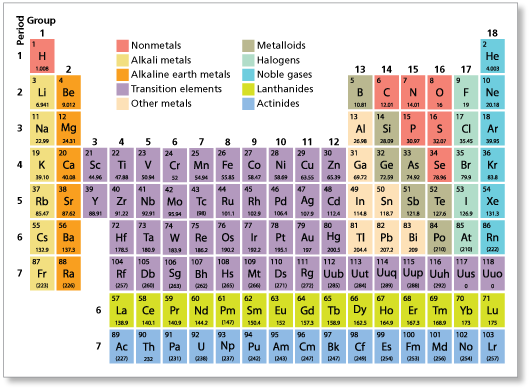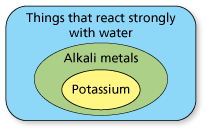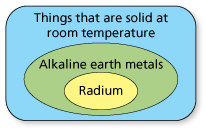-
Use the periodic table and the list of chemical properties to write a syllogism that involves potassium (element 19). Then draw a set diagram.

Chemical Properties
- All discovered alkali metals react strongly with water.
- All discovered alkaline earth metals are solid at room temperature.
- All discovered noble gases are odorless.
- All actinides are radioactive.
-
Here is one possible syllogism about potassium.
• Premise: All discovered alkali metals react strongly with water. • Premise: Potassium is an alkali metal. • Conclusion: Potassium reacts strongly with water. Don't try this! Dropping pure potassium in water can produce a violent explosion. If you search "video, potassium, water," you can watch such an explosion on the Internet.
Here is one possible set diagram.

Comments (0)These comments are not screened before publication. Constructive debate about the information on this page is welcome, but personal attacks are not. Please do not post comments that are commercial in nature or that violate copyright. Comments that we regard as obscene, defamatory, or intended to incite violence will be removed. If you find a comment offensive, you may flag it.
When posting a comment, you agree to our Terms of Use.Showing 0 commentsSubscribe by email Subscribe by RSSThere are no comments. -
Use the periodic table and the list of chemical properties to write a syllogism that involves xenon (element 54). Then draw a set diagram.

Chemical Properties
- All discovered alkali metals react strongly with water.
- All discovered alkaline earth metals are solid at room temperature.
- All discovered noble gases are odorless
- All actinides are radioactive.
These comments are not screened before publication. Constructive debate about the information on this page is welcome, but personal attacks are not. Please do not post comments that are commercial in nature or that violate copyright. Comments that we regard as obscene, defamatory, or intended to incite violence will be removed. If you find a comment offensive, you may flag it.
When posting a comment, you agree to our Terms of Use. -
Use the periodic table and the list of chemical properties to write a syllogism that involves radium (element 88). Then draw a set diagram.

Chemical Properties
- All discovered alkali metals react strongly with water.
- All discovered alkaline earth metals are solid at room temperature.
- All discovered noble gases are odorless.
- All actinides are radioactive.
-
Here is one possible syllogism about radium.
• Premise: All discovered alkaline earth metals are solid at room temperature. • Premise: Radium is an alkaline earth metal. • Conclusion: Radium is solid at room temperature. Here is one possible set diagram.

These comments are not screened before publication. Constructive debate about the information on this page is welcome, but personal attacks are not. Please do not post comments that are commercial in nature or that violate copyright. Comments that we regard as obscene, defamatory, or intended to incite violence will be removed. If you find a comment offensive, you may flag it.
When posting a comment, you agree to our Terms of Use. -
Use the periodic table and the list of chemical properties to write a syllogism that involves thorium (element 90). Then draw a set diagram.

Chemical Properties
- All discovered alkali metals react strongly with water.
- All discovered alkaline earth metals are solid at room temperature.
- All discovered noble gases are odorless.
- All actinides are radioactive.
These comments are not screened before publication. Constructive debate about the information on this page is welcome, but personal attacks are not. Please do not post comments that are commercial in nature or that violate copyright. Comments that we regard as obscene, defamatory, or intended to incite violence will be removed. If you find a comment offensive, you may flag it.
When posting a comment, you agree to our Terms of Use. -
There are hypothetical alkali metals that have not been discovered. Use inductive reasoning to draw a conclusion about all alkali metals, discovered or undiscovered.

Chemical Properties
- All discovered alkali metals react strongly with water.
- All discovered alkaline earth metals are solid at room temperature.
- All discovered noble gases are odorless.
- All actinides are radioactive.
-
Here is one possible conclusion.
- All discovered alkali metals react strongly with water.
- So, all alkali metals (discovered or undiscovered) react strongly with water.
These comments are not screened before publication. Constructive debate about the information on this page is welcome, but personal attacks are not. Please do not post comments that are commercial in nature or that violate copyright. Comments that we regard as obscene, defamatory, or intended to incite violence will be removed. If you find a comment offensive, you may flag it.
When posting a comment, you agree to our Terms of Use. -
There are hypothetical alkaline earth metals that have not been discovered. Use inductive reasoning to draw a conclusion about all alkaline earth metals, discovered or undiscovered.

Chemical Properties
- All discovered alkali metals react strongly with water.
- All discovered alkaline earth metals are solid at room temperature.
- All discovered noble gases are odorless.
- All actinides are radioactive.
These comments are not screened before publication. Constructive debate about the information on this page is welcome, but personal attacks are not. Please do not post comments that are commercial in nature or that violate copyright. Comments that we regard as obscene, defamatory, or intended to incite violence will be removed. If you find a comment offensive, you may flag it.
When posting a comment, you agree to our Terms of Use. -
Suppose ununennium (hypothesized element 119) is an undiscovered alkali metal. Write a syllogism that involves how ununennium reacts with water. Use your conclusion from Exercise 27 as your first premise.

Chemical Properties
- All discovered alkali metals react strongly with water.
- All discovered alkaline earth metals are solid at room temperature.
- All discovered noble gases are odorless.
- All actinides are radioactive.
-
Here is one possible syllogism.
• Premise: All alkali metals (discovered or undiscovered) react strongly with water. • Premise: Ununennium is an undiscovered alkali metal. • Conclusion: Ununennium reacts strongly with water. "Ununennium also known as eka-francium or element 119, is the temporary name of a hypothetical chemical element in the periodic table that has the temporary symbol Uue and has the atomic number 119. To date, attempted syntheses of this element have been unsuccessful. Since it is below the alkali metals it might have properties similar to those of francium or caesium. Like other alkali metals, it should be extremely reactive with water and air. A predicted oxidation state is 1. Ununennium would be the first element in the eighth period of the periodic table and the seventh alkali metal." (Source: Wikipedia)
These comments are not screened before publication. Constructive debate about the information on this page is welcome, but personal attacks are not. Please do not post comments that are commercial in nature or that violate copyright. Comments that we regard as obscene, defamatory, or intended to incite violence will be removed. If you find a comment offensive, you may flag it.
When posting a comment, you agree to our Terms of Use. -
Suppose unbinilium (hypothesized element 120) is an undiscovered alkaline earth metal. Write a syllogism that involves unbinilium's state at room temperature. Use your conclusion from Exercise 28 as your first premise.

Chemical Properties
- All discovered alkali metals react strongly with water.
- All discovered alkaline earth metals are solid at room temperature.
- All discovered noble gases are odorless.
- All actinides are radioactive.
These comments are not screened before publication. Constructive debate about the information on this page is welcome, but personal attacks are not. Please do not post comments that are commercial in nature or that violate copyright. Comments that we regard as obscene, defamatory, or intended to incite violence will be removed. If you find a comment offensive, you may flag it.
When posting a comment, you agree to our Terms of Use.





